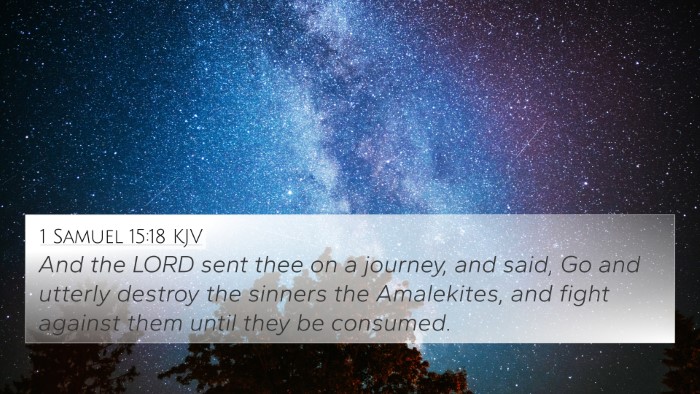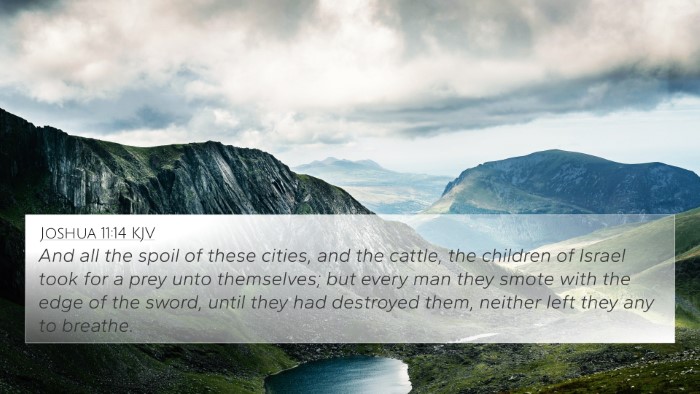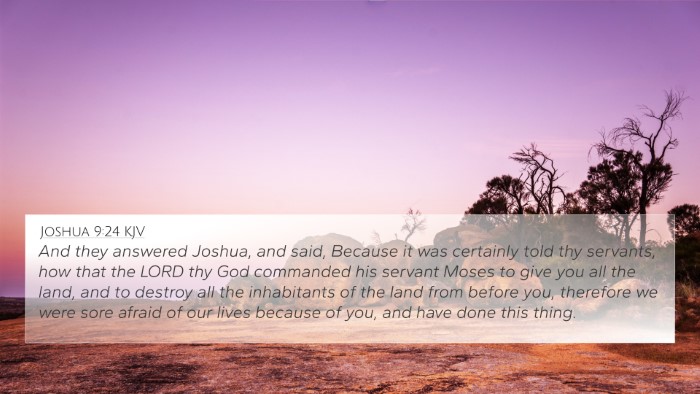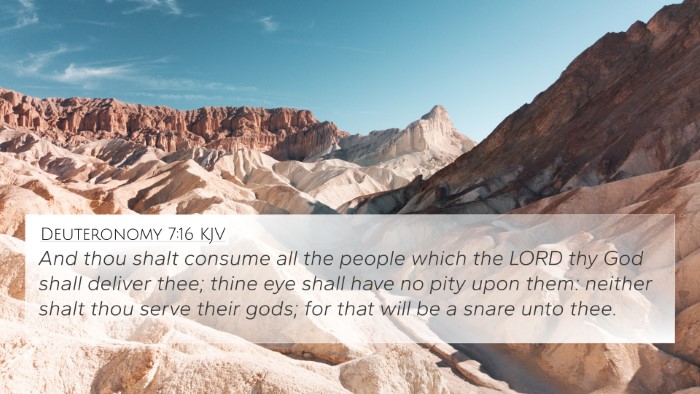Understanding Joshua 6:21
Joshua 6:21 states, "And they utterly destroyed all that was in the city, both man and woman, young and old, and ox, and sheep, and ass, with the edge of the sword." This verse describes the Israelites' destruction of Jericho after the walls had fallen, as part of God's command to Joshua.
Summary of Exegesis
In this passage, the emphasis is on complete obedience to God's instructions, demonstrating a serious aspect of divine judgment. The destruction is not simply an act of violence, but fulfills God's command regarding the wickedness of the Canaanite nations.
- Divine Judgment: Matthew Henry notes that the destruction reflects God's judgment against sin and rebellion, exemplifying the severity that accompanies divine commands.
- Obedience to God: Adam Clarke emphasizes that Joshua and the Israelites’ actions were in strict obedience to God's directive, highlighting the theme of faithfulness in carrying out divine will.
- Symbolism of Totality: Albert Barnes explains that this total destruction symbolizes the eradication of sin, suggesting a deeper spiritual lesson about the necessity of eliminating all forms of wickedness from one’s life.
Contextual Analysis
This event occurs within the broader narrative of the conquest of Canaan. The Israelites were commanded to destroy Jericho as a signal of the beginning of their conquest. Such actions illustrate the stark contrast between the lifestyles of the Israelites, who were to serve God, and the Canaanites, who engaged in practices that were an abomination to the Lord.
Cross-References and Thematic Connections
This verse connects to several other passages in both the Old and New Testaments. These connections illustrate themes of judgment, obedience, and the consequences of sin. Some notable cross-references include:
- Deuteronomy 20:16-18: God's instruction on the treatment of cities in warfare.
- 1 Samuel 15:3: Saul is commanded to destroy the Amalekites, showing a similar theme of divine judgment.
- Hebrews 11:30: Mention of Jericho's fall, highlighting the faith of the Israelites.
- Romans 6:23: The wages of sin is death, paralleling the destruction of those who were unrepentant in Jericho.
- Revelation 21:8: The fate of the cowardly and the abominable, linking to final judgment themes.
- Joshua 7:1: The consequences of sin in Israel after Jericho’s conquest.
- Psalm 37:10: Assurance that the wicked will be cut off, resonating with the fate of Jericho.
Lessons and Applications
The broader implications of Joshua 6:21 can be significant for contemporary believers:
- Call to Obedience: The act of destruction serves as a reminder of the importance of obeying God's commandments without compromise.
- Understanding Judgment: The passage illustrates the seriousness of divine judgment and the need for vigilance against sin in our lives.
- Faithfulness in Conflict: The historical context encourages believers to remain faithful and steadfast, even when tasked with difficult challenges.
Cross-Referencing and Thematic Connections
The practice of cross-referencing Bible verses allows for a deeper understanding of Biblical themes. The investigative study of Joshua 6:21 can be enriched through the examination of related verses. By utilizing tools for Bible cross-referencing, believers can find meaningful relationships between scriptures. For example, connecting this verse with verses discussing God's faithfulness to Israel (Isaiah 55:11) reveals a consistent message about God's purpose and the consequences of human action.
Conclusion
The story of Jericho's destruction as presented in Joshua 6:21 is pivotal in understanding God's judgment, the importance of obedience, and the nature of sin. The interconnectedness of different verses throughout the Bible reinforces the comprehensive narrative of salvation, judgment, and divine sovereignty. Engaging in cross-referencing allows believers to draw deeper theological insights and reinforces the continuity of God's message throughout Scripture.
SEO Related Keywords
In researching this verse, one may explore Bible verse cross-references, connections between Bible verses, and linking Bible scriptures. The importance of Bible verse parallels in understanding these themes is crucial. Tools for Bible cross-referencing such as concordances and guides can significantly aid in discovering relationships among verses, providing a comprehensive view of scriptural teachings.
Further Study
For those seeking to dive deeper, consider exploring Bible cross-reference guide materials and studying the details of cross-references in the Bible that illuminate interactions between the Old and New Testament.

















